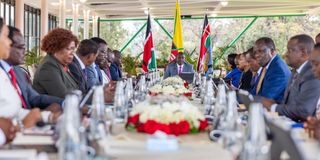NHIF transforms into SHA, expands coverage as Cabinet approves sweeping reforms

The first Cabinet meeting since the appointment of new Cabinet Secretaries
What you need to know:
- Kenya will transition from NHIF to a Social Health Authority (SHA) from October 2024, expanding health programmes such as Edu Afya and Linda Mama to cover more children and provide comprehensive maternal care.
- The Hustlers Fund will introduce a third product focused on SMEs, increasing financial inclusion for two million borrowers with good credit histories.
The government, in its first Cabinet meeting since the appointment of new Cabinet Secretaries, has ratified the transition from the National Health Insurance Fund (NHIF) to the Social Health Authority (SHA), effective October 1, 2024, as it seeks to ensure that Kenya attains universal health coverage.
Through this strategic realignment, the state intends to broaden the scope of existing programmes such as Edu Afya to encompass all school-going children, extending beyond its current focus on secondary school students.
On the same breadth, Linda Mama Programme will also be expanded to not only cover prenatal care but also provide comprehensive postnatal care to ensure a more robust approach to maternal and child health.
Kenyans who are yet to register for the new SHA scheme are urged to do so through *147# or by visiting www.sha.go.ke.
The country’s policy-making organ discussed the progress of the Financial Inclusion Fund, commonly referred to as the “Hustlers Fund” that has since its inception two years ago, disbursed Sh57 billion to Kenyans, with at least two million customers now regular daily borrowers.
To bolster the Fund’s customers, the Cabinet directed the rollout of a third product to support the Small and Medium Enterprises (SME) sector. This product will prioritise the two million beneficiaries who have demonstrated a strong credit history with the Fund.
“This ground-breaking initiative aims to create a pathway for banking the targeted beneficiaries, further deepening financial inclusion within the SME sector,” part of the Cabinet dispatch read.
Thus far, the Fund has successfully mobilised Ksh. 3.2 billion in savings.
To conserve the nation’s heritage and natural splendour, the Cabinet discussed a raft of policies that will accelerate climate change adaptation in the country.
Among the key issues discussed in this particular section were Kenya’s preparations for seed distribution under the National Landscape and Ecosystem Restoration Strategy 2023– 2032, which aims to plant 15 billion trees.
The Cabinet also approved the establishment of the Kenya Watershed Services Improvement Programme (KEWASIP). This programme seeks to preserve the nation’s rich heritage through the restoration of degraded landscapes while enhancing watershed services and building climate resilience across the country.
The Cabinet discussed and approved the hosting of the third African Forum on Cybercrime in November 2024 in Kenya.
The Cabinet also approved free entry to all parks for Kenyans on September 28, 2024, as the world marks the United Nations World Tourism Day. This will be after the marking of the UNWT week beginning September 22 until September 28, 2024.
It was also in this meeting that the Cabinet discussed measures proclaimed by President William Ruto during the swearing-in ceremony of the reconstituted Cabinet aimed at enhancing accountability and efficiency within the public sector.
These measures include the enforcement of surcharges on public officials responsible for financial losses, implementing a unified personnel identification system to combat 'ghost worker' fraud, and establishing a framework for the continuous vetting of public officers with centralized wealth declarations.
Additionally, there will be a focus on accelerating the investigation and prosecution of corruption and economic crimes, with legislative amendments to ensure resolutions within six months.
Other key measures involve revising the Witness Protection Act to better support whistleblowers, transitioning to a zero-based budgeting system starting from FY 2025/26, and improving the VAT refund process to increase transparency and accountability.




